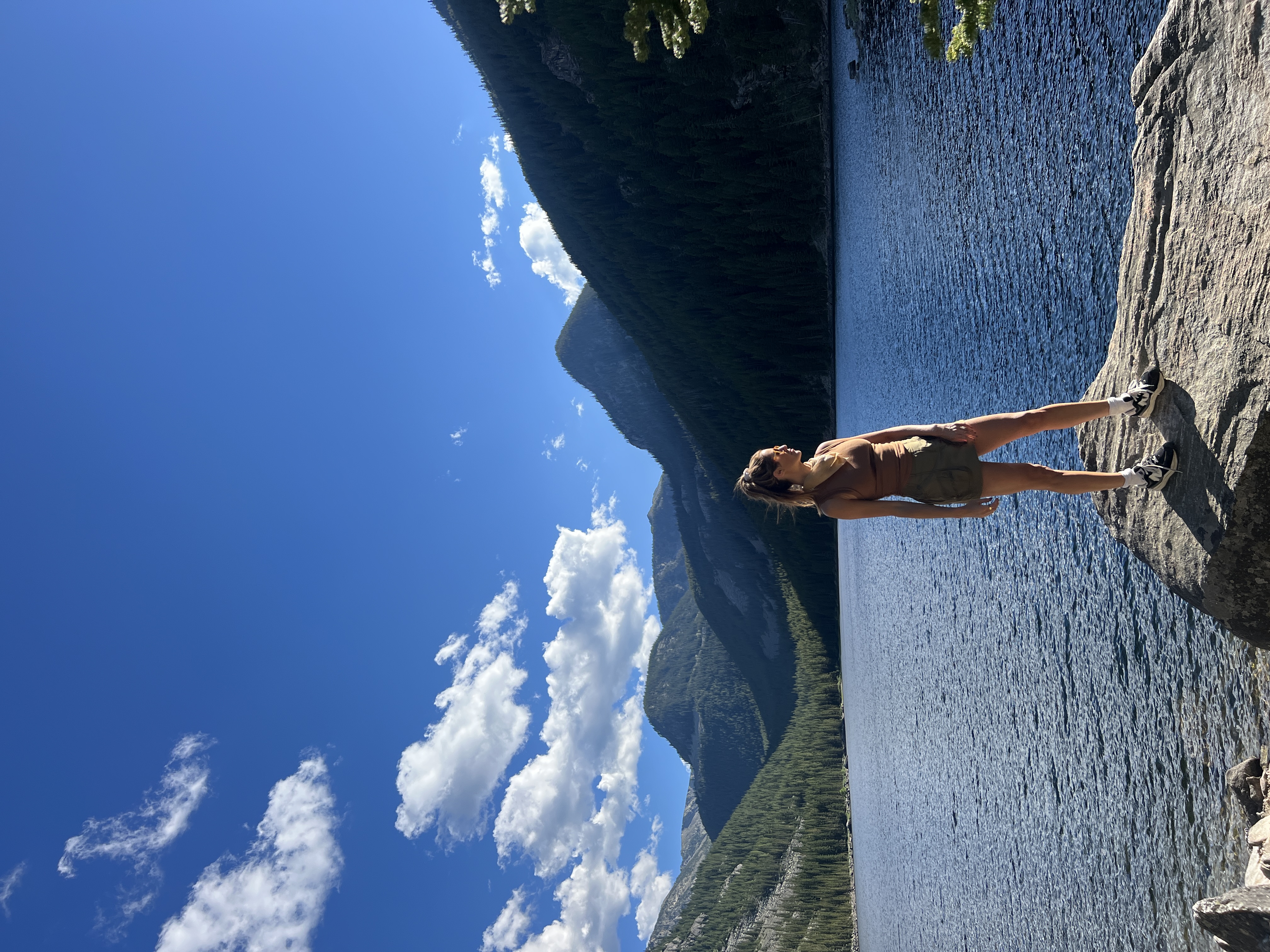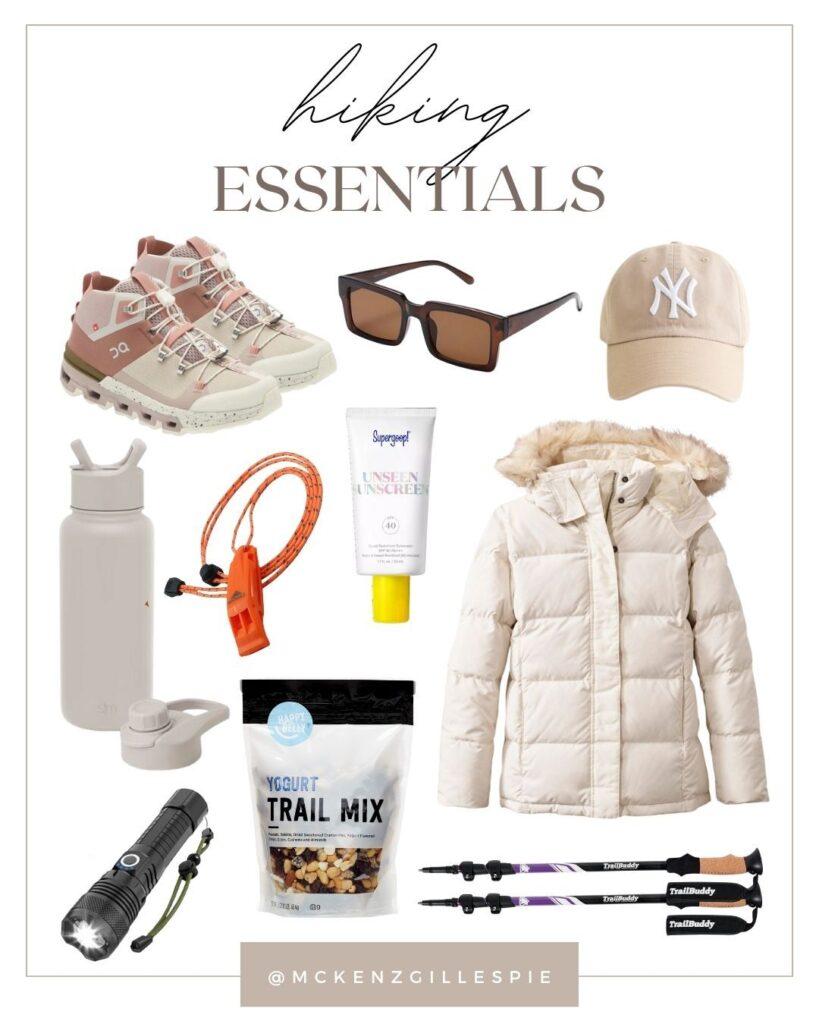
If you’re wondering what essentials for a hiking backpack are important, you’re in the right place. As someone who loves the great outdoors, hiking is one of my favorite pastimes. There’s just something about being fully immersed in nature that is so refreshing to the soul. It’s a great way to get some exercise while also disconnecting from the hustle and bustle of daily life.
I’ve hiked in a few different places, from the rolling hills of the Midwest to the rugged terrain of the Pacific Northwest. No matter where I go, though, one thing is always the same: I always have to make sure I have the essentials for my hiking backpack.
When it comes to hiking, it’s not just about the scenery and fresh air—you also need to have the right gear. Especially as a female hiker, having the right gear is essential to ensure a successful and safe trip. From sturdy hiking boots and a well-fitted backpack to sunscreen and a reliable water bottle, it’s important to be prepared.
Today I’m sharing some of the best tips I’ve learned from my hiking trips, as well as a roundup of essentials for hiking backpacks to help ensure you are ready for whatever your next hiking adventure brings.
And if GLAMPing is more your style, be sure to check out my full Under Canvas Review!
Please note that this article may contain affiliate links, which means that I may earn a commission if you purchase through these links.
Essentials for Hiking Backpack

Backpack
Whether you’re going for a stroll through the woods or embarking on a rugged mountain climb, a good backpack will make all the difference. Not only will it be more comfortable to wear for long periods, but it will also allow you to carry all the essentials and then some. Plus, there’s just something about strapping on a backpack and heading out into the great outdoors that makes you feel like a true adventurer.
Navigation Tools
Good navigation tools are essential when heading off the beaten path. While it might be tempting to rely solely on technology, it’s important to have a backup plan in case battery life is low or you lose signal. Maps and compasses may seem old-fashioned, but they’re reliable tools that can help you navigate even in the most remote locations.
Hydration Necessities
One essential item for any hiking trip is a reliable way to stay hydrated. Whether you prefer a water bottle or a hydration system, make sure you have plenty of water with you. And if you’re planning on drinking from natural sources, such as streams or lakes, don’t forget to bring along water purification tablets or a filter. Being prepared with these essentials can make all the difference in having a fun and comfortable hiking experience.
Food and Snacks
Trust me when I tell you that nothing ruins a hike like a growling stomach. A hiking trip can quickly go south if you’re not prepared with some good snacks to keep your energy up. That’s where high-energy snacks like nuts, trail mix, and energy bars are essentials for a hiking backpack. If you’re not sure how long you’ll be out there, it’s also smart to think about portable, non-perishable meals which may also come in handy.
Clothing
While packing for a hiking trip can seem overwhelming, I like to start with the basics: weather-appropriate clothing, a sturdy pair of shoes, and plenty of outer layers depending on the climate. I also recommend a hat and sunglasses to protect you from the sun’s harsh rays and keep pesky insects out of your face. And, of course, don’t forget to pack extra socks – blisters are a hiker’s worst nightmare.
Footwear
Proper footwear is essential for a safe and comfortable journey. I suggest hiking boots or shoes that are made specifically for trail runners. Whether you’re traversing rocky terrain or crossing a creek, you want to make sure your feet are well-protected and supported. If you plan on tackling rougher terrain, I suggest bringing along a pair of gaiters. These handy accessories will keep debris and rocks out of your shoes, as well as provide an extra layer of protection against scratches and scrapes
Shelter
Sure, you might have a killer playlist and all the latest hiking gear, but if the unexpected happens, you’ll wish you had something to protect you from the elements. Whether you opt for a lightweight tent or a space blanket, make sure it’s something that won’t weigh you down but can still keep you safe and warm. Trust me, you don’t want to be caught in the middle of nowhere without a way to shield yourself from whatever Mother Nature has in store.
Rain Gear
If rain is a possibility on your upcoming adventure, it’s worth considering investing in a waterproof rain jacket or a moisture-wicking poncho, as well as some waterproof pants or gaiters. Not only will they help keep you dry in the event of a downpour, but they’ll also help protect against wind and chill, making your outdoor experience all the more enjoyable.
Multi-Tool or Knife
When hitting the trails, a multi-tool and knife are essentials for a hiking backpack. Not only can it cut through everything from rope to food packaging, but it also has a range of other functions including a screwdriver, scissors, and even a pair of pliers. It’s pretty much like having a mini toolbox in your pocket. Plus, you never know when you may need to make an emergency repair on the fly.
Flashlight
One essential item that often gets overlooked is a good flashlight. Sure, you may plan to be done before nightfall, but things don’t always go according to plan. A flashlight can come in handy for those unexpected moments when you need a little extra light on the trail.
Fire Starting Tools
Whether you’re planning an overnight trip or just a day hike, matches or a lighter are critical essentials for a hiking backpack. But to be extra safe, consider also bringing a fire starter, waterproof matches, or even a magnesium starter. You never know when you may need to get a fire going to stay warm, dry your socks, or cook your dinner. So pack those fire-starting tools, and you’ll always be ready to tackle whatever the trail throws your way.
Sun Protection
No matter where you are going or what you are doing, it’s important not to forget about sunscreen. Even though it may be cold and cloudy outside, the sun’s harmful UV rays can still penetrate through the clouds and cause damage to the skin. It’s recommended to use sunscreen with at least SPF 30 and to apply it liberally to all exposed skin, especially the face, neck, and hands. I like to apply mine before I head out for a hike and also reapply throughout the day.
First Aid Supplies
A small first aid kit is always a good idea when getting outdoors, and it’s especially important when hiking. Injuries such as cuts and bruises can happen on the trails, so it’s best to be prepared. A basic repair kit should include items such as bandages, antiseptic wipes, pain relievers, and a cold pack. It’s also a good idea to include any necessary personal medications, such as inhalers or epinephrine pens, in the first aid kit.
Bug Repellent
When hiking in the great outdoors, it’s important to protect yourself from mosquito bites, which can carry diseases such as Zika and dengue fever. I always pack insect repellent containing DEET to keep mosquitoes away. It’s also a good idea to wear long-sleeved shirts and pants if you are hiking during dawn and dusk when mosquitoes are most active.
Emergency Whistle
When you’re out hiking, it’s always better to be safe than sorry. That’s why an emergency whistle is one of the most important day hiking essentials I make sure to bring with me. Sure, it may seem like a small and insignificant item, but in an emergency, it can make all the difference. Need to alert someone to your location? Blow your whistle. Want to scare off a potential predator? Blow your whistle. Plus, it’s lightweight and easy to carry, so there’s no excuse not to have one.
Portable Charger
A portable charger is an absolute essential when hiking. Not only does it provide peace of mind knowing I won’t miss capturing that stunning view or getting lost without GPS, but it can also be a lifesaver in case of an emergency. Trust me, you don’t want to be stranded without a way to make a call if you need to.
Trekking Poles
You might think that hiking poles are only for those who are elderly or have bad balance, but the truth is that they offer a whole range of benefits to hikers of all levels. For starters, they can help reduce the risk of injury by providing added support and stability on uneven terrain. And if you’re carrying a heavy pack, trekking poles can help distribute the weight, taking some of the strain off your knees and hips. Not to mention, they can also be used to help navigate through tricky river crossings or steep descents.
Duct Tape
Before you hit the trails, don’t forget to duct tape it up! It may seem like a strange item to bring on a hike, but this sticky tape can be a lifesaver when used for gear repair. Got a tear in your backpack? Use duct tape. Shoes falling apart? Duct tape to the rescue. Plus, it’s lightweight and easy to stash in your pack, making it a no-brainer addition to your hiking essentials list.
Tips for Packing a Hiking Backpack
- Create a checklist of essential items based on the length and nature of your hike. This ensures you don’t forget anything important.
- Place essential items like water, navigation tools, first aid kit, and extra clothing in easily accessible pockets or the top of your backpack.
- Distribute weight evenly to maintain balance and reduce strain on your back. Heavier items should be closer to your back and centered, while lighter items can be placed towards the outside.
- Utilize the various compartments of your backpack for specific purposes. For example, use side pockets for water bottles and snacks, and the top lid for quick-access items.
- Organize your gear in layers within your backpack. Place items you won’t need until camp deeper in the pack, while frequently used items should be more accessible.
- Keep your map and compass in an easily accessible pocket or compartment. You may need them quickly, especially in unfamiliar terrains.
- Place emergency essentials like a first aid kit, whistle, and emergency shelter in a designated pocket for quick access.
- Pack food and snacks in a way that allows for easy access during breaks. Consider using a separate bag for trash to keep your pack clean.
The specific essentials for a hiking backpack you take may vary depending on the length and difficulty of your hike, as well as the environmental conditions. Always check the weather forecast before you hit the trail and tailor your packing list accordingly. Happy hiking!






No Comments